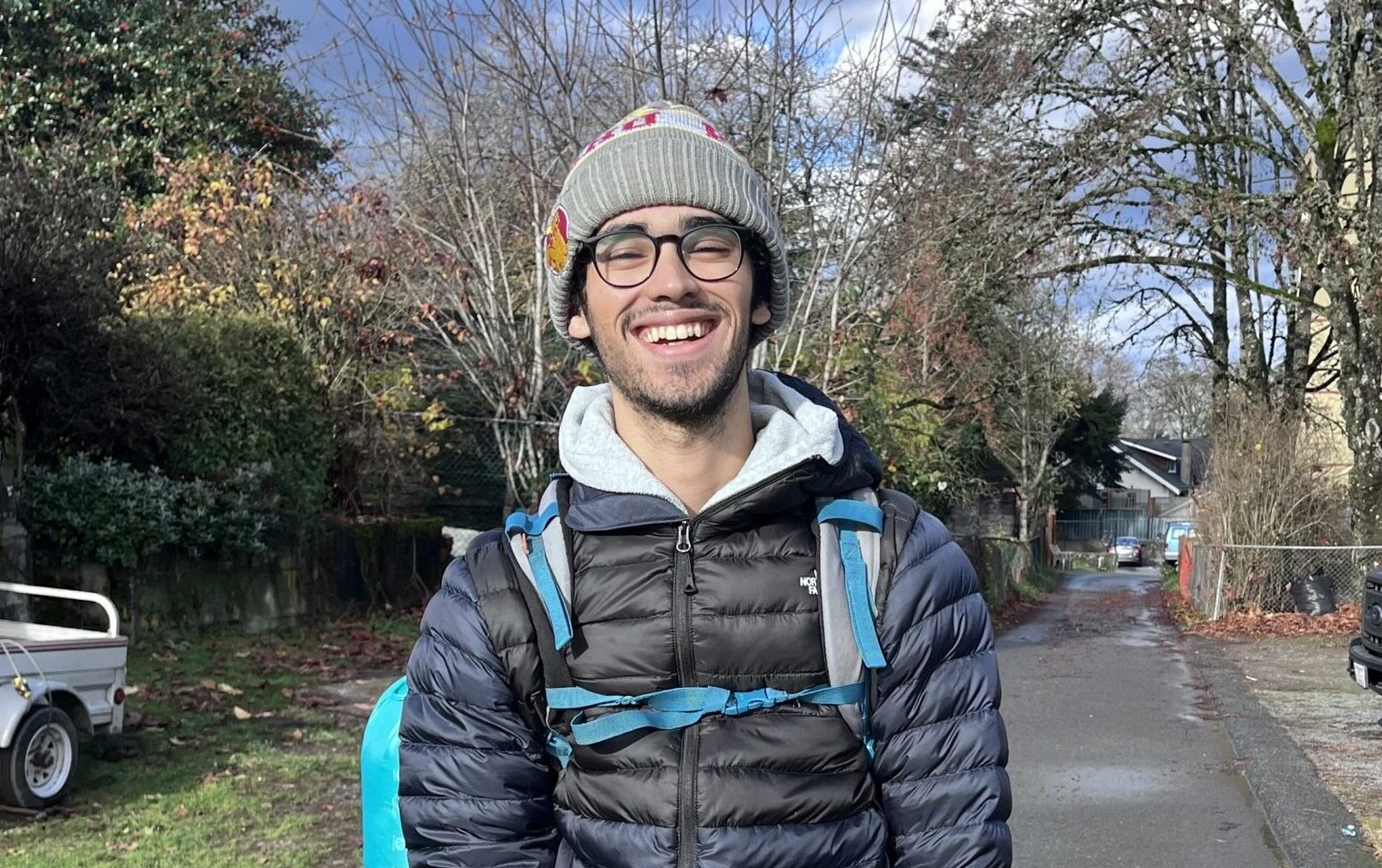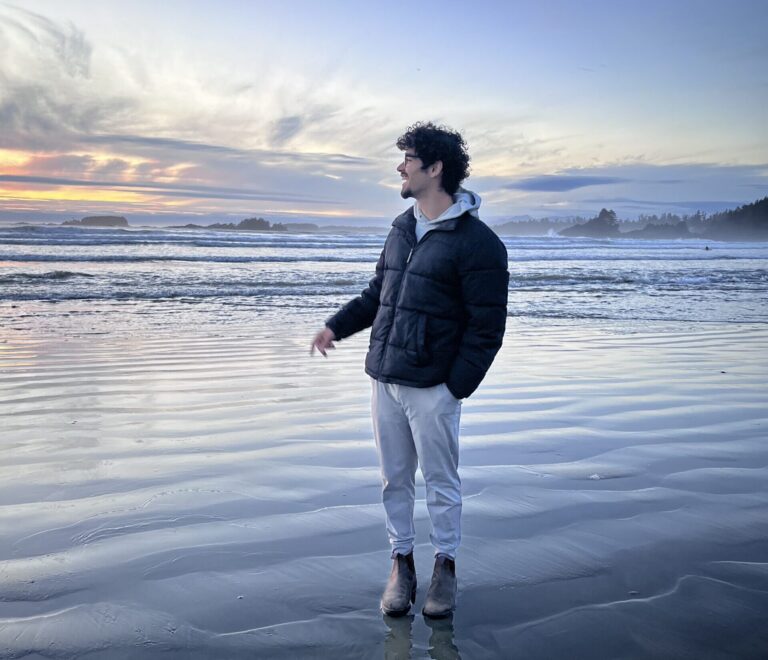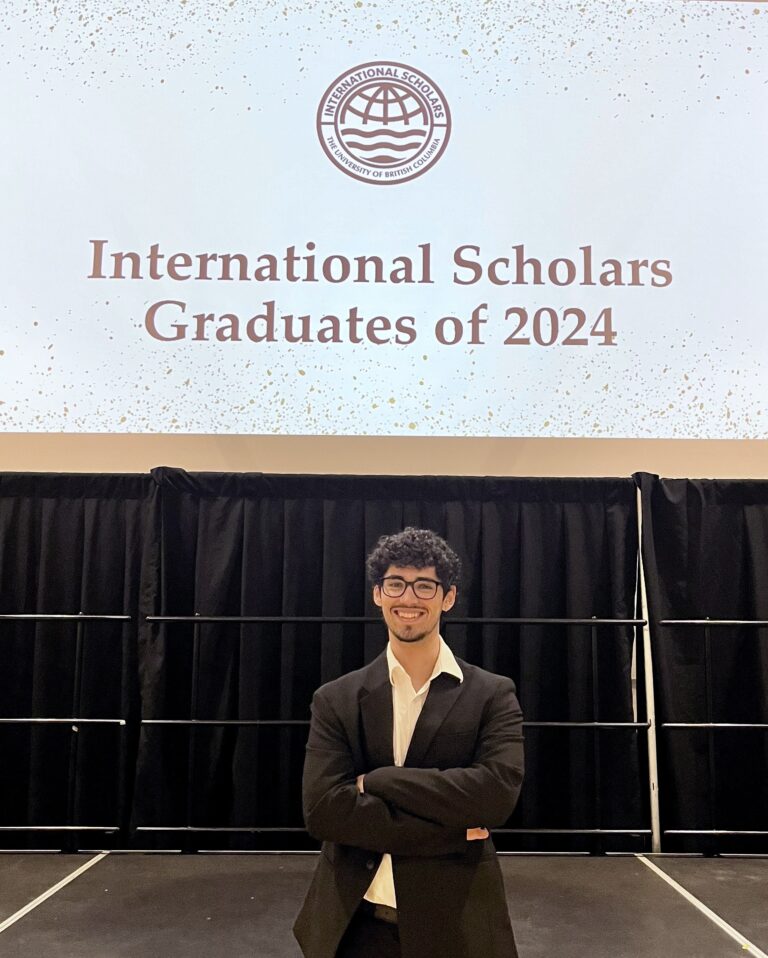During his Bachelor of Arts degree, Hammad felt uniquely supported to pursue his passion for community engagement and social impact, receiving a $10,000 grant that helped fund a project that addressed the global impact of the fast fashion industry on marginalized communities. He credits the International Scholars Program for giving him the “resources to collaborate with faculty, staff, and stakeholders at UBC and beyond to address issues of social justice and equity.”
As he reflects on his time at UBC, Hammad says the interdisciplinary nature of his BA degree gave him a “unique lens through which to view and understand the world.” His worldview continued to broaden throughout his geography studies where he found the small class sizes made it easier to build friendships and express himself in class. Because of that, explains Hammad, he experienced “a sense of belonging and support that comes with feeling heard and valued.”
Choosing to study at UBC is a decision that gave him an opportunity to not just achieve a degree but evolve and grow as a person. “The successful life I have made for myself here is a testament each day to that decision.”
What made you decide to enroll in Arts? What was your decision process like?
When applying to UBC, I was still trying to decide my major. However, I was drawn to the diversity of the degrees, coursework, and research in the Faculty of Arts. I enjoyed the idea of taking courses from various disciplines while working towards my degree requirements. That has given me unique access to knowledge, skills, and experiences that have been invaluable for my growth and development.
After I submitted my application to the Faculty of Arts, the admissions office reviewed it based on my grades, personal statements, and extracurriculars. I got my early acceptance at the end of January, but offers are sent out till May. One tip for the application is to show who you are and what you are passionate about.
What has been your experience in the program so far?
One of the highlights of my program has been connecting with people who have similar interests and values. The smaller class sizes have allowed me to build close relationships with students and award-winning faculty, participate in class discussions and engage with others. I experienced a sense of belonging and support. As an international student, having space to share my lived experiences, knowledge, and skills has been particularly important. This inclusive atmosphere inspired me to pursue a directed studies course, where I conducted research on urbicide—the deliberate destruction of civilian infrastructure in urban areas during warfare—a subject of deep personal interest. Through this research, I have gained valuable skills in qualitative analysis, scholarly work, and critical thinking.
Additionally, my interactions and connections with faculty in my program have led me to develop and facilitate a geography student-directed seminar, Palestine in the World. This experience has been incredibly rewarding, as it allowed me to gain hands-on experience in seminar development, teaching, and facilitation training. Through this process, I was able to delve deeply into topics I am passionate about while creating an inclusive space for other students to engage in critical discussions about this significant issue.
Do you have any special memories at UBC that stand out? Is there a moment that validated your decision to come to UBC?
I have many fond memories of my time at UBC. One particular moment that stands out is during my first-year Jumpstart experience, an orientation program that gives new UBC students a chance to connect with campus life, learn about opportunities, and connect with other students. This orientation program has given me the chance to meet one of my closest friends from my first year who I have grown to care for, appreciate, and admire. It gave me a space to dance, eat, sing, and laugh with people from around the world, leaving me with never-ending memories. Most importantly, it made my experience at UBC feel less intimidating.
As I started my first year, I became more confident and comfortable about who I was. Every moment I reflect on how I have evolved and what I have achieved and am yet to achieve, I know that coming to UBC was the right decision for me.
How has receiving the Don Wehrung International Student Award opened up opportunities for you?
This award has opened up opportunities beyond what I would have imagined. It has helped me grow personally and professionally. The award’s support and resources have enabled me to develop new skills and knowledge, discover my potential, and shape my personal growth. The experiences I’ve gained, the memories I’ve made, and the people I’ve met have each positively impacted who I have become.
Adding to that, as an international scholar, I have been empowered to make meaningful contributions and changes to my community through various initiatives. One such project involved receiving a Students as Partners Grant from UBC, which allowed me to work closely with a faculty member to redesign and develop an upper-year Arabic course, Advanced Studies in Arabic Language and Cultures.
My involvement in this project was in response to heritage and native Arabic-speaking students, like myself, who were looking for a space where they could develop their proficiency in Standard Arabic, celebrate their diverse Arab identities, and engage with questions unique to the Arab-Spring generation. The course creates space at UBC for Arabic-speaking students to examine and co-create knowledge through alternative, often marginalized epistemologies, enriching their own learning experience and the process of knowledge production on campus.
I was also involved in the creation of a project titled Social Impact Initiatives Tracker, an initiative that aims to enhance the visibility of social impact projects undertaken by IBPOC-led organizations in BC by building a wiki-based online platform. This initiative focuses on enhancing visibility for IBPOC-led organizations by sharing their projects and initiatives in a virtual space, building a space for collaboration between IBPOC-led organizations and local communities (in Vancouver and BC), and easing public access to information and opportunities for engagement with local IBPOC-led organizations in BC.


